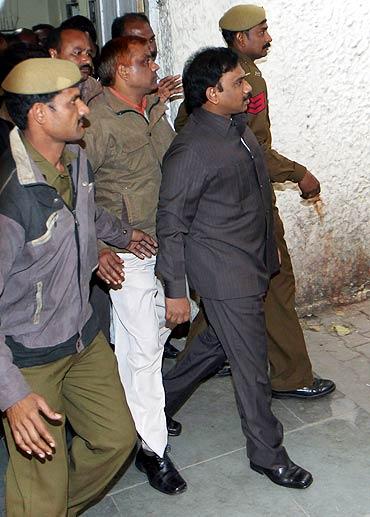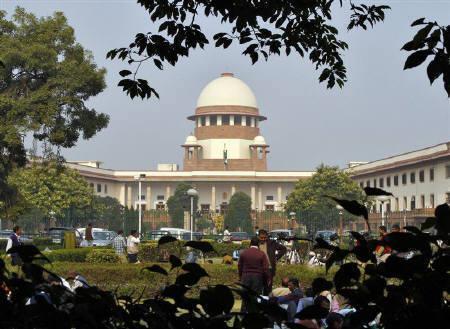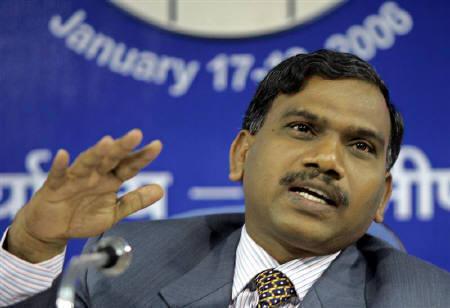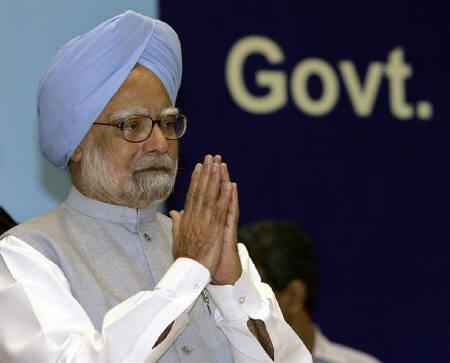
Former Supreme Court judge Ashok Kumar Ganguly says former telecom minister A Raja acted unilaterally in the 2G spectrum mess and that his Cabinet colleagues are not to be blamed.
Speaking to Karan Thapar on CNN IBN's Devil's Advocate, Ganguly said it is not correct to apply the principle of collective Cabinet responsibility in the case related to the distribution of 2G licences on a first-come-first-served basis. Edited excerpts:
Let me start with the comment made about your recent sanctions and 2G judgments, both delivered in the last 30 days. The first was reserved in November 2010 and made public 13 months later. The second one was reserved in March 2011 and delivered 11 months later. Both were delivered during an election campaign and in some quarters, this has led to people being suspicious about the timing and the delay. How do you respond to that sort of comment?
I understand the judgment had to be delivered during my tenure, since I was a party to it. I was retiring on February 2, and that date can't be altered. So, I thought it is better to deliver the judgment than to keep it undelivered. In my tenure as a judge for 18 years, I have not kept any judgment undelivered reserved by me.
Now, these two judgments were heard by a bench of Justice Singhvi and myself, but both were reserved by Singhvi. I can tell you if the judgment had been reserved by me, it would have been delivered long ago.
In others words, the reservations were done by your brother judge?
Yes, senior brother judge.
Click on NEXT for more...
Click here for Rediff Realtime News

And you were determined to deliver it before you retire.
Otherwise, it would have been a huge loss of time. Because these cases can't be dismissed off the cuff, these cases were heard, at least more than 30 days were devoted. Again, when judicial time is so precious, I would have felt sad and people would have criticised the system, if these judgments were not delivered.
So, the suspicion in some quarters about the delay or the timing is unwarranted.
Absolutely.
And the delay is just because your fellow judge, your senior fellow judge, wanted to reserve it for a while?
Yes, because judges are under tremendous pressure, especially in the Supreme Court. So, as a result of this pressure, it must have been delayed. I am sure the delay is not intentional.
In the 2G spectrum case, you found the first-come-first-served basis fundamentally flawed. You believe it is a violation of constitutional principles, and when it comes to allocation of scarce natural resources, the state must always adopt the method of auction. Are you prepared to accept any exceptions to that rule? Is there any room for discussion?
Let me tell you, I am not here to defend the judgment.
Absolutely, I am only asking for explanations. I am not asking you to defend.
I'll tell the judgment is a reasoned one. The reasons are all there. Of course, you are right and true, there is no such absolute proposition. All propositions have to be considered in the facts of the case. In the facts of the case discussed in the judgment, we thought that is the only viable option.
Click on NEXT for more...
Click here for Rediff Realtime News

Is the ruling that the state must always adopt the method of auction should apply to all natural resources?
I can't say because it has been said in the context of the facts considered in the judgment.
Is it possible in the context of other scarce natural resources, for instance water or land for hospitals and schools, auction may not be the best way?
I am not here to sort of predict those lines. It all depends on facts. Normally, land for hospitals and schools are acquired under the Land Acquisition Act.
So, the auction does not apply there.
Naturally.
So, there is, in fact, room for discretion because this is the issue that many people have asked themselves -- is there a room for discretion or is this an inflexible rule, a rigid principle?
Yes, discretion, as you know, is the life blood of any judicial decision. There can't be any straitjacket.
It appears you have pinned the blame entirely on Raja, but you have not paid sufficient heed to the principle of collective Cabinet responsibility. Surely, such a momentous decision requires the Cabinet also accept the responsibility?
I think from the judgment, if you look at the judgment facts properly, you find the minister concerned didn't pay heed to requests made by other ministers, including the one by the law minister, to put the matter before the empowered committee.
Click on NEXT for more...
Click here for Rediff Realtime News

As a result of which, the collective Cabinet responsibility, you are saying, doesn't apply?
In a way, yes. Because that is why we find there is no proper policy.
What about the fact that in the three areas that Raja was found to have acted wrongly -- pricing, advancing the cut-off date, determining the first-come-first-served in terms of letter of intent rather than in terms of date of application, he either informed the prime minister or the PM overlooked it or ignored it or the PM gave him advice which Raja overlooked and the PM didn't look. Doesn't that point the finger all the way to the PM?
You are again asking me about the nitty-gritties of the judgment.
But you are absolutely convinced this instance, the principle of collective Cabinet responsibility does not apply.
Possibly that is not followed.
It doesn't apply...
It was not applied to this particular case.
It wasn't followed. Raja acted unilaterally, which is why his Cabinet colleagues possibly don't share any blame?
Possibly, yes.
Click on NEXT for more...
Click here for Rediff Realtime News
...